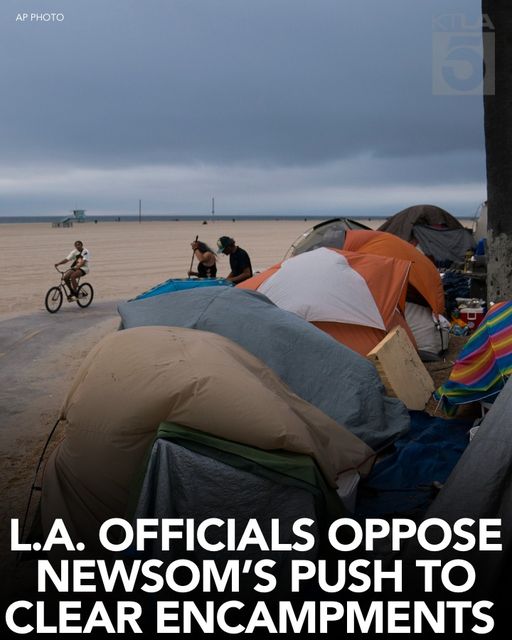Los Angeles city leaders are fiercely against Gov. Gavin Newsom’s executive order that directed local governments to urgently address homeless encampments.
The executive order issued last week puts pressure on local agencies and departments to “adopt clear policies that urgently address homeless encampments while respecting the dignity and well-being of all Californians.”
The order comes after a Supreme Court ruling which gave local governments more tools and authority to address encampments and provide resources to those in need.
“Governor Newsom’s executive order directs state agencies to adopt humane and dignified policies to urgently address encampments on state property, including by taking necessary and deliberate steps to notify and support the people inhabiting the encampment prior to removal,” Newsom’s office said in a statement.

At a meeting on Tuesday, the L.A. County Board of Supervisors reaffirmed their stance that homelessness should not be criminalized with a unanimous vote in favor of a “care first” approach to combating the issue that spans 88 cities with a combined homeless population of over 75,000 people.
“My position has and continues to be that I do not believe the criminalization of homelessness is the right path,” L.A. County Supervisor Kathryn Barger said. “Quite frankly, I find it almost ludicrous to think that we’re going to issue $250 tickets to individuals who are unhoused who are then going to get another ticket and another ticket and then have a warrant out for their arrest…and for what?”
Los Angeles County Sheriff Robert Luna was present at Tuesday’s meeting and also voiced his opposition to the executive order, stating that being homeless is not a crime and that LASD will continue to focus on criminal behavior as opposed to a person’s housing status.
Some L.A. County residents, however, are more apprehensive at the county’s approach at getting unhoused people out of encampments.

“We ask that you reexamine and prioritize certain areas we aren’t seeing success in,” one woman called in to say during Tuesday’s board meeting. “We don’t see adequate delivery of mental health services or drug rehabilitation services…it seems [the county is] taking too long in implementing SB 43, you do not protect the public space and our residents are suffering from negative ramifications from prolonged encampments.”
The state cannot force cities to adopt the measures outlined in the governor’s executive order, but they can incentivize local agencies through funding and advise them to adopt policies consistent with those being used by Caltrans – which include providing advanced notice of clearance, working with local service providers and storing personal property collected at the site for at least 60 days.
The full executive order can be read here.
